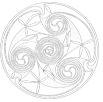Easing into Complexity with Good Initiation
By Paul Dunion | February 25, 2025

Before looking at how we can ease into Complexity, let’s look at what it is. Complexity is a description of a kind of problem and the epistemology (a method used to explore how to understand a problem). Here are some examples and characteristics, as well as recommended epistemology for addressing complex problems.
Examples: Addressing climate change, exploring the merger of two companies with different cultures, addressing a broken marriage, ending a war, addressing world hunger, curing polio, and raising children.
Characteristics: Much uncertainty and unpredictability, lack of precedents and background knowledge, unclear causal relationships, and considerable mystery.
Epistemology: Exploration, curiosity, patience, unattached to outcome, collaboration, clarity about emotions held by the explorers, postponing an attachment to answers, letting go of control needs and focusing on the conditions supporting explorations, little or no use of the scientific method of observation, collecting and analyzing data, drawing a conclusion and sharing it with colleagues, the use of imagination and intuition.
Complicated Problems
Contrasting the nature of complicated problems to complex ones can help to clarify the different nature of these problems and the resistance arising in regard to adopting a complex epistemology.
Examples: Fixing your vacuum cleaner, buying a vehicle appropriate for your needs and budget, baking a pie, writing a book, building a garden and dry well.
Characteristics: Focuses on generating answers, ideas preferred over emotions, clarity about how to proceed, a readiness to employ research.
Epistemology: Relying upon formulas and algorithms previously employed, identifying apparent causal relations, depending upon someone’s expertise, employing some aspect of the scientific method.
Aggrandizing the Epistemology of Complicated Problems
We love having answers. Well, it didn’t take long in any grade school experience to figure out we were much better off having an answer, preferably the right one or the most accepted one by the teacher. It suggested we were intelligent, accepted by authority and just made us feel damn good about ourselves. And quite worse about ourselves when we didn’t have one. On an emotional level, answers relieved the angst and anxiety of possibly facing being someone who didn’t possess an answer.
Our acclaim of answers likely grew stronger in adulthood. Now, we might garnish more prestige and occupational mobility by demonstrating we could generate answers. From problems with plumbing to sophisticated technology, supplying answers got us hired, paid, and maybe promoted. Answers simply seemed the way to generate a desirable lifestyle and answers are almost guaranteed by the epistemology of complicated problems. Could it be that answers are praised, while curiosity is easily dismissed as simply announcing an answer is missing?
The more answers we generate and the more comfortable we are, such as the relationship with our beloved devices, the more we are willing to believe all problems can eventually be reduced to a set of formulas. Marcelo Gleiser offers an honest call back to understanding knowing and unknowing, and the limits of our formulas. “As the island of knowledge grows, so do the stories of our ignorance – the boundary between the known and the unknown. Learning more about the world doesn’t lead to a point closer to a final destination but to more questions and mysteries.”
Contemporary Initiations
The word initiate means “to begin,” and the tribe or the culture will communicate what is to begin. As with all beginnings, an ending happens also. Our culture is barren of rituals supporting the Initiation into adulthood. Regarding knowledge, families, schools and other social institutions tell us that adulthood means knowing how to work with complicated problems. The Initiation calls for the end of imagination, fantasy, magic and superstition.
As we celebrate the plethora of answers we’ve generated, it seems only natural that life itself can be approached as just one more complicated problem. After listening to several thousand folks describe themselves and how they see life, a popular life formula becomes clear. “Get the proper education, the right job, make the right financial investments, make the right acquisitions, marry the right spouse and live in the right neighborhood, resulting in you being successful and life is understandable, predictable and secure.” The formula may generate a measure of comfort and offer a very misleading account of life – bad ontology.
Sacred Initiations
An old definition of the word sacred is “confirming what truly matters.” Such an Initiation can tell us who we are and what truly matters about the journey we call life. We can say that good epistemology (explaining how to go about knowing) depends upon a good ontology (describing the actual nature of life). In his book, The Power of Myth, the noted mythologist Joseph Campbell describes how the four functions of myth can help us understand life. The four functions include the mystery of Nature, the mystery of the Cosmos, the mystery of Others and the mystery of the Self.
The many myths canvassed by Campbell suggest we are living in four dimensions of mystery. A sacred Initiation teaches us about the mystery of life and how to relate to the mystery. Anthropologists describe the Initiation ritual employed by numerous indigenous peoples as the ritual of the Mysterium Tremendum or Great Mystery. The initiates would be subjected to the ritual for three to five years. The elders were committed to transmitting an understanding of life as mysterious, unpredictable and insecure. Finally, the initiates were encouraged to find their purpose while on a vision quest and decide how that purpose might best serve the people.
Leaving the Old Initiation
Before we can benefit from such an initiation, we may need to grieve and let go of our attachment to the “right everything Initiation.” It certainly helped us to apply SM to simple and complicated problems, which had a smaller measure of mystery than a complex problem. Due to the pandemic and the intricacies of our technologies and systems, we believe there is now more mystery. Mystery has been with us since the beginning of time. There were voices that reminded us of the mystery, and we may not have heard them. “Do not grow old, no matter how long you live. Never cease to stand like curious children before the great mystery into which we were born.” (Albert Einstein)
We’re dealing with a complex problem anytime we approach a problem where there is little or no precedent to call upon or when we step into unknown areas of our own and others’ psychologies. There’s always a measure of mystery.
Benefits of a Sacred Initiation
*More easy holding ambiguity. There’s less likelihood of getting “tranquilized by trivia” (Kierkegaard) or settling for “contrived certainty” (James Hollis).
*Remain in relationship with the four expressions of mystery. We are interested in living the mystery of life on life’s terms, neither interested in conquering life nor being its victim.
*We anthropomorphize life. We relate to life as if it is a real person, being clear about what we want from life and curious about what life is asking of us.
*There is little or no attachment to an outcome. As we release our compulsion to get life right, we remain curious about how we might allow life to get us right.
*Live with more respect and reverence for what life brings to us. There is a greater interest in serving rather than being served.
*Greater ease with addressing complex problems. When there is more comfort with the mystery of life generally, the more comfort results with the mystery of different problems.
*There is a greater capacity to distinguish what can be controlled and what cannot. Accompanying this ability is the capability to let go of what you can’t control and focus on what you can.
*There is an enhanced willingness to be informed by arational mediums. These include art, music, film, theater, dance, myth and poetry.
*We have the opportunity to make peace with the Mysterium Tremendum. This enables us to let go of efforts to conquer life or fall victim to its inevitable trials and ordeals.
The elders are not likely to come for us and devote years to initiating us into the Mysterium Tremendum. However, there are workshops, seminars, trainings, retreats, and vision quests aimed at helping us to accept this mysterious journey and work with it creatively. For example, there is The Mankind Project is an international organization offering a weekend Initiation for men with follow up support. As we embrace the ontology of life being a great mystery, accepting the epistemology of Complexity may have more ease.
